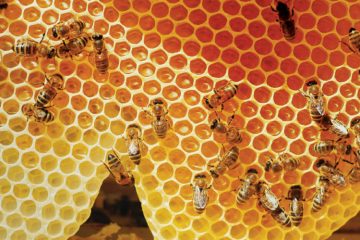Alvéole: Have You Heard The Buzz?
Fuzzy bumblebees float around so slowly and gracefully that it almost makes you want to pet them! We need these adorable little creatures to pollinate our crops. In fact, we should be humbled by the bumblebee because, without them, there would be very few crops to harvest. In other words, we couldn’t live without them. Meet Angela Stathakos and Devon Doane of Alvéole, a turnkey beekeeping company founded in 2013 to help bring beehives to the rooftops of businesses, schools and other organizations. Their goal? Making the world a better place, one bee at a time.
Urban beekeeping is opening our eyes to the lives of bumblebees. “It’s a world that a lot of people don’t know about that’s happening right in the city,” says Angela Stathakos, Alvéole’s beekeeping team manager.
Almost 10 years ago, three men who had spent part of their youth at their uncle’s commercial beekeeping farms decided to bring some hives back to the city and see what would happen. Their neighbours and friends were super excited. “It’s the magic that happens in that moment when people who are terrified of something…get blown away by it,” says Stathakos. So, they thought, let’s see what happens if we put it on a roof.
The result? It snowballed into an urban beekeeping business. Last year, in the GTA alone, nine beekeepers were visiting about 350 clients. Unlike commercial beekeeping operations, the idea of Alvéole is to engage and educate as many people as possible. They are conscious of all their decisions, and they’re proud of their B Corp certification, meaning they’re legally required to consider the impact of their decisions on workers, customers, suppliers and the environment.
“We like to say that we use honeybees as the gateway bug”
Since there are no huge fields to place the bees in urban areas, most of the beekeeping happens on rooftops. As a turnkey operation, Alvéole provides the bees, installs and maintains the hive every three weeks. As well, they run workshops, including one of six called Meet Your Bees, where people can watch the operation in action.
“We like to say that we use honeybees as the gateway bug,” laughs Stathakos, as talking about the honeybees can lead to bigger conversations about the environment and urban sustainability. And people get invested in the bees. “Once we have a hive on site, people want to help, and they ask, ‘What do we need to do for our bees?’” says Devon Doane, an urban beekeeper at Alvéole. So, some clients put out nice little water dishes and plant pollinator gardens to support the bees.
And now, the two women would like to clear up a few misconceptions.
1. The queen bee is important, but she’s not necessarily the most important. “All of the bees are important,” says Doane. “It’s all of them when they combine their efforts…it’s like [an analogy] to the rest of life: everyone has to work together for the greater good.” Get this: the colony can make new queens (just like high school!).
2. Wasps give bees a bad rap, especially last year, since it seemed as if there were a lot of wasps around. Many clients were calling to say the bees were causing problems. Wasps are not bees.
3. Bees are true pollinators. They are herbivores. “They’re so busy collecting pollen and nectar and bringing it back to the colony that they honestly couldn’t care less about us most of the time,” says Stathakos.
“You might have an idea of how you want to work with them…but really, they’re going to teach you things about how you should be working with them”
What’s coming down the pipeline? The organization is expanding – across continents now. And one project they’re launching this year will be focusing on wild bees in a few select cities. Wild bees are solitary — they like to live by themselves, nesting in odd places like a hole made in a tree by a woodpecker, for instance. There’s no queen bee, and they just gather food for themselves and their offspring. Wait, what? These bees don’t have hives? Yep, and they don’t bother making honey, either.
OK, so how can we help the bees? “Start by converting your grass lawn to a clover one,” says Doane. “Bees love the clover, so it’s a great pollinator plant.” And leave the dandelions alone, because they feed on them, too.
One message Doane wants to get out is that as much as bees are managed, they are wild creatures. “You might have an idea of how you want to work with them…but really, they’re going to teach you things about how you should be working with them,” she says. “At the end of the day, the bees are going to do what they’re going to do.”
INTERVIEW BY ESTELLE ZENTIL
















































































